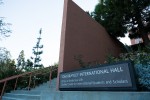International students who are arrested could be removed from the country following the federal government’s new emphasis on screening immigrants.
The Dashew Center for International Students and Scholars met with student leaders Feb. 7 to talk about the changes in national immigration enforcement that have taken place in the past year. Sam Nahidi, the center’s interim director, said the new Department of Homeland Security definitions of what constitutes a threat has made it easier for arrested international students to be denied entry to the U.S. or to have their visas terminated.
According to the University of California’s 2017 report on fall enrollment, 11.5 percent of undergraduate students and 18.7 percent of graduate students at UCLA are international students.
The UCLA Chancellor’s Advisory Council on Immigration Policy sent an email Feb. 14 to inform international students that being arrested could get them removed from the country and to offer them resources to learn about their legal rights.
”An arrest may result in severe and irreversible implications for your visa status,” the council said in the email.
UCPD has also been working to educate students about actions or circumstances that could lead to an arrest. UCPD Lt. Kevin Kilgore said the department met with representatives of the Undergraduate Students Association Council, Graduate Students Association and UCLA administration last week to inform students of the various kinds of situations, such as getting into a physical altercation or smoking marijuana on UCLA grounds, that could lead to arrests.
He added it is important that all students know the consequences of being arrested and ways to avoid being arrested.
“We don’t want someone to be arrested. It’s a process that’s costly for them, and it leads to time away from class,” he said. “We just don’t want any Bruins involved in the court system at all, if we can avoid it.”
Ricardo Vazquez, a UCLA spokesperson, said the university has noticed this new trend in immigration enforcement, which has raised the consequences of being arrested, over the past year.
“We have received reports from students whose visas or entry into the U.S. have been denied due to having an arrest record, and we have advised affected individual students of their options,” he said.
Pedro Noguera, a professor of education at the Graduate School of Education and Information Studies, said restrictive immigration enforcement policies could make the U.S. less inviting to highly skilled immigrants – international students make up the majority in science, technology, engineering and math graduate programs.
He added he thinks more students will start considering other countries with more hospitable environments for higher education.
“Many universities rely on immigrants for income and to make up a significant amount of student population,” he said. “These policies are not in our interests and make college less accessible to students.”
Student leaders said they think it is important for the university to better educate students about the laws in America.
Alexander Fung, the Graduate Students Association’s vice president of internal affairs, said he thinks the university needs to make sure students understand that U.S. laws are different than the ones in their home countries. For example, he said, in Hong Kong, individuals can legally drink in public, while doing so in America could get an individual in trouble with the police.
“In the U.S., things that are legal can become illegal depending on where you do them, like drinking in public or smoking marijuana on campus and on federal grounds, which can lead to them getting into trouble unintentionally,” he said.
In the council’s email informing students about the new risks, it reminded students to engage in demonstrations safely and lawfully, warning them that protests which become disruptive can lead to arrests.
Fung said he thinks it is important for the university to educate students about the consequences of the new regulations but said he thinks the email, which prominently mentioned protests, had a tone that discouraged international students from exercising their First Amendment rights.
“Properly educating and communicating with people is a big problem when it comes to international students, and I don’t like that the administration is hinting students shouldn’t protest,” Fung said.
Ashraf Beshay, president of the International Student Leadership Coalition, said he thinks the email discourages international students from participating in upcoming protests at the UC Regents’ meeting in March at UCLA. Regents may vote to increase nonresident tuition at the meeting.
“‘Don’t get arrested’ cannot be the only message students receive,” he said. “That’s the kind of advice you get in an undemocratic nation with an oppressive regime – we can do better.”
